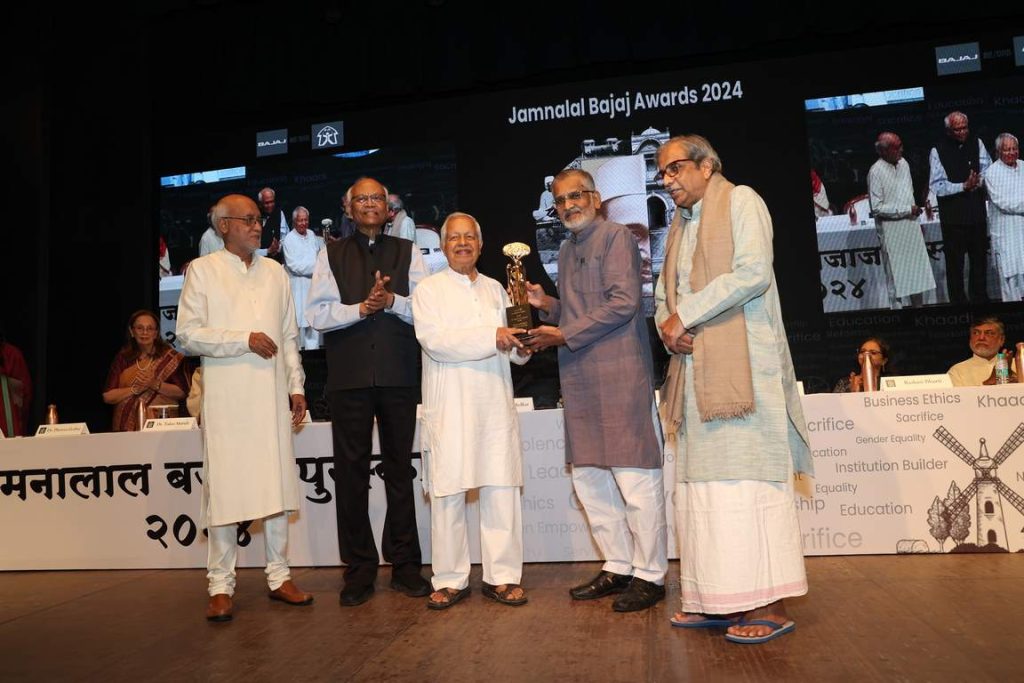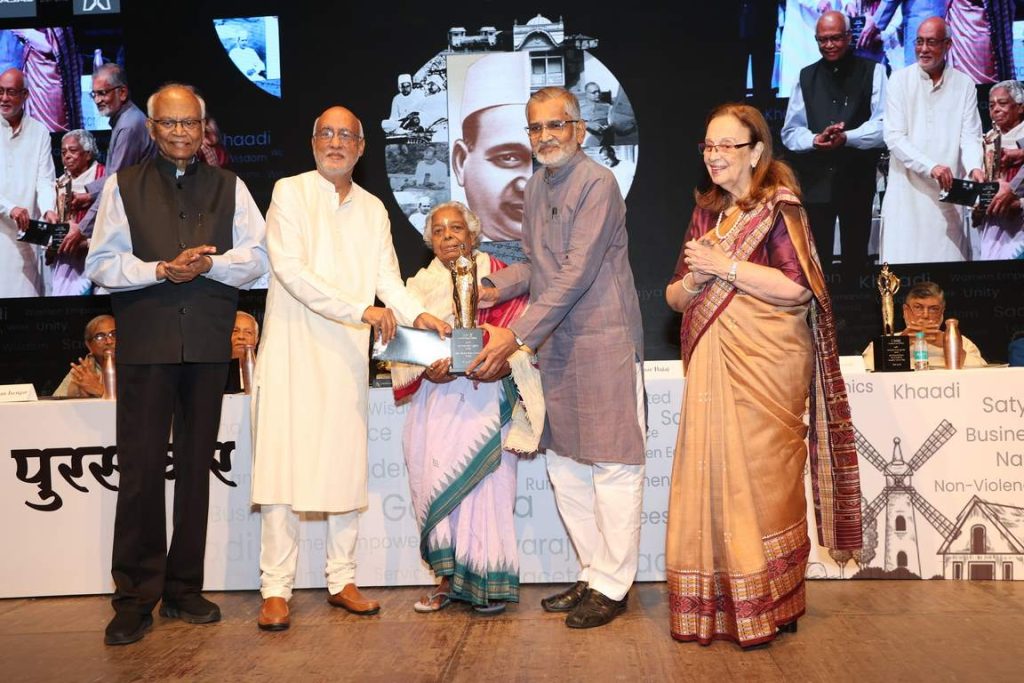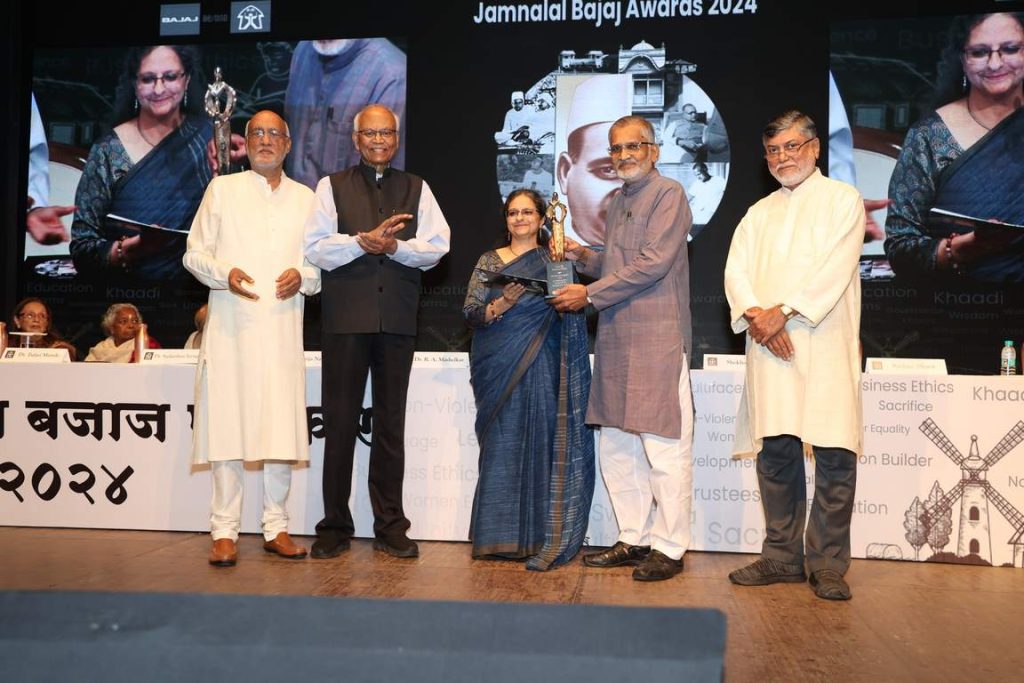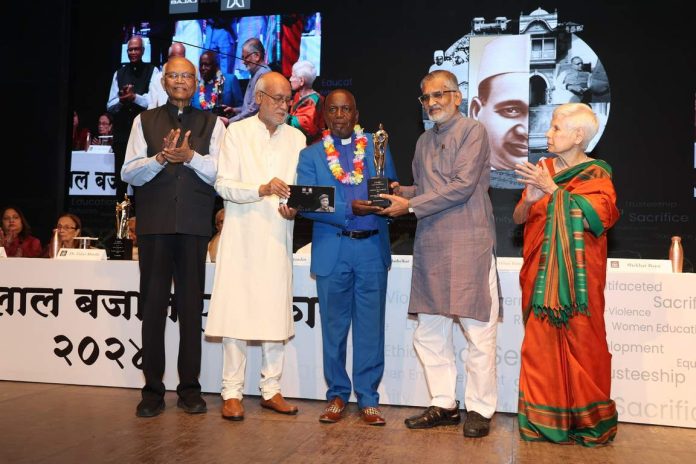- In honor of Shri Ramkrishna Bajaj’s centennial legacy, each awardee has received an increased prize of Rs. 20,00,000 since 2023.
- Awardees from Jharkhand, Uttarakhand, Odisha, and the Democratic Republic of Congo were felicitated at this year’s award ceremony
MUMBAI: The Jamnalal Bajaj Foundation honored winners for their exemplary efforts in the field of humanitarian and social work at the 46th edition of the Jamnalal Bajaj Awards. The four awardees were felicitated today at the annual award function in the presence of the Chief Guest Dr. Abhay Bang, Founder & Director, Society for Education, Action and Research in Community Health (SEARCH), Shekhar Bajaj, Chairman, Board of Trustees of Jamnalal Bajaj Foundation, Members of the Council of Advisers of the Foundation and the august gathering. Nobel Peace Laureate Kailash Satyarthi is the Trustee of the Foundation and Dr. R. A. Mashelkar, Former Director General, of the Council of Scientific and Industrial Research and chairman of the National Innovation Foundation also serves as a Chairman, of the Council of Advisers of the Foundation.
Since the institution of these awards, the Foundation commemorates the birth anniversary of Shri Jamnalal Bajaj every year. As a tribute to the great man on this special occasion, the Foundation felicitated achievers in the field of humanitarian activities and Gandhian constructive programs by presenting them with a Citation, a Trophy, and a Cash Prize.
In tribute to the centennial celebration of Shri Ramkrishna Bajaj, Founder of the Jamnalal Bajaj Foundation, the prize money was raised in 2023 from Rs. 10,00,000/- to Rs. 20,00,000/- (or its equivalent in foreign exchange for the International Award) per category. This commemorative increase continues in 2024 as the Foundation honors Shri Jamnalal Bajaj’s lifelong commitment to Gandhian values and societal advancement.
The details of the awards for this year (2024) are:
| Award Category | Awardee Name and Title | State/Country |
| Award for Constructive Work | Girija Nandan | Jharkhand |
| Award for Application of Science & Technology for Rural Development | Rashmi Bharti | Uttarakhand |
| Award for Development and Welfare of Women and Children (Instituted in memory of Padma Vibhushan Jankidevi Bajaj) | Dr. Tulasi Munda | Odisha |
| International Award for Promoting Gandhian Values Outside India | Reverend Erik Kumedisa | Democratic Republic of Congo |
Shekhar Bajaj, Chairman, Board of Trustees, Jamnalal Bajaj Foundation addressing the occasion said, “Each year, the Jamnalal Bajaj Foundation Awards illuminate the incredible stories of individuals who, through their selfless service, carry forward Gandhian values into modern society. Congratulations to all the recipients; your dedication transforms communities and exemplifies the enduring power of Shri Jamnalal Bajaj’s ideals and Mahatma Gandhi’s constructive work programs. We invite others to be inspired by your work and to join in building a more compassionate world.”
Dr. R. A. Mashelkar, Chairman, of the Council of Advisers stated, “Our awardees exemplify resilience and devotion in preserving and advancing Gandhian principles, which remain as relevant today as ever. We honor not only their remarkable achievements but also the unwavering dedication with which they pursue their work. These individuals embody the timeless values of truth, non-violence, and unity, creating a better world for all. Their contributions remind us that Shri Jamnalalji’s and Gandhiji’s ideals are not bound by time, but continue to inspire a meaningful change.”



The Winners
Girija Nandan
Recipients of the Award for Constructive Work
Girija Nandan, recipient of the 2024 Award for Constructive Work, has dedicated his life to advancing Gandhian ideals in Bihar and Jharkhand through transformative social programs. Born in a small village, he was moved by the hardships of the rural poor, motivating him to set up Nav Bharat Jagriti Kendra (NBJK) in 1971, which has since become a beacon of community service and empowerment across the region. His efforts have created lasting change through initiatives in education, healthcare, women’s empowerment, and advocacy for social justice.
- Grew up in Bataspur, Bihar, and was deeply impacted by early exposure to poverty and health challenges in the villages.
- Inspired by Gandhian ideals and motivated by his work with Vinoba Bhave’s Samanwaya Ashram during his youth.
- Joined Jayprakash Narayan’s relief efforts during famines in Odisha and Bihar, which strengthened his commitment to social justice.
- Co-founded Nav Bharat Jagriti Kendra (NBJK) in 1971 to address social issues in Bihar and Jharkhand.
- Supported NBJK financially in its early years by working as an engineer, and donating his salary.
- Actively engaged in Lok Samiti, a people’s organization started by Jayprakash Narayan, empowering communities to demand rights and local governance.
- Established six high schools and two primary schools, providing quality education to over 5,000 children annually, with a focus on girls.
- Set up Lok Nayak Jaiprakash Eye Hospitals, performing over 2,00,000 cataract surgeries and serving 5,00,000 outpatients in Bihar and Jharkhand.
- Organized 537 Self-Help Groups (SHGs) for Persons with Disabilities (PwDs), promoting financial inclusion for 3,598 PwDs.
- Led organized efforts to provide medical treatment for over 6,000 individuals with mental disorders, challenging superstitions.
- Established micro-credit programs for women, supporting 900 SHGs, enabling 10,000 women to engage in income-generating activities.
- Trained over 30,000 unemployed youth in vocational skills, resulting in job placements for approximately 60%.
- Spearheaded WASH programs in Jharkhand, benefiting 50,000 households, and improving sanitation, waste collection, and recycling.
- Advocated for labor rights, and led campaigns like the Right to Work, grassroots democracy, and the Manav Jodo Abhiyan for inter-caste harmony.
- Inspired and supported over 100 voluntary organizations in Bihar and Jharkhand, creating a legacy of social service and empowerment.
“In our work, we have learned that instead of applying a one-size-fits-all development model across the country or a state, it would be more effective to provide assistance tailored to the needs of individuals or families, resulting in greater achievements with lower costs.
Despite economic prosperity, if a person is not virtuous, peace and happiness cannot prevail in their life or in society. Therefore, while continuing with the current developmental work, we want to strive towards prohibition and building a morally upright society.
This award inspires us to make even greater efforts to become the voice of those standing on the margins of society and bring more improvement to their lives.” Girija Nandan
Rashmi Bharti
Recipient of the Award for Application of Science and Technology for Rural Development
Rashmi Bharti, co-founder of Avani Society and a visionary in rural development, has spent over three decades creating sustainable livelihoods, empowering local communities, and preserving traditional crafts in Uttarakhand and Odisha. With her focus on eco-friendly practices, Rashmi Bharti has pioneered initiatives in renewable energy, natural dyes, and rural enterprise, transforming remote villages and providing self-reliant income avenues for over 2,000 artisans. Her dedication to sustainable rural development exemplifies her belief in local action for global impact.
- Rashmi Bharti, along with her husband, Rajnish Jain, founded Avani in the Himalayas, focusing on sustainable rural development in Uttarakhand.
- Led the installation of 3,000 solar lights across 25 remote villages, bringing renewable energy access to underserved communities.
- Revived hand spinning and weaving with Tibetan sheep wool, which now empowers 2,200 artisans across 64 villages.
- Generated Rs. 6 crores in income for local communities through Avani, benefiting youth, artisans, and rural families.
- Founded the Kumaon Earthcraft Self-Reliant Cooperative in 2005, which provides decentralized work opportunities to women and school dropouts in remote villages.
- Created the AVANI brand, offering high-quality, naturally dyed handloom textiles and eco-friendly products that emphasize fair trade and zero waste.
- Introduced natural dyes to reduce soil and water pollution, using local plant materials like myrobalan, marigold, and walnut.
- Addressed environmental harm caused by synthetic dyes, focusing on sustainable practices to protect the fragile Himalayan ecosystem.
- Utilized the invasive eupatorium plant as a natural dye source, linking economic benefits with environmental conservation.
- Provided training to rural men and women in natural dyeing techniques, which are applied across textiles, art supplies, and eco-friendly paints.
- Advocated for small farmers nationwide to cultivate natural dyes, promoting sustainable income and contributing to climate resilience.
- Named a runner-up for the St Andrews Prize for Environment in 2022 for her groundbreaking work with natural dyes.
- Showcased Avani’s eco-friendly products at events like the Ethical Fashion Show in Paris and the Ethical Fashion Forum in London.
- Linked rural farmers with global environmental impact by integrating climate-conscious practices into traditional agriculture.
- Lives by the philosophy of “leaving the Earth a little more beautiful than we found it,” inspiring others toward sustainable and meaningful change.
“The challenges were many – of changing mindsets, of being accepted by the community and to set up an initiative that would last beyond our lifetime. It was a slow progression built on dialogue, inclusiveness, and compassion. Learning was mutual and respectful of the traditional knowledge systems. It allowed us to have a friendship with the community not as beneficiaries but as people living in the same ecosystem. The fact that we were living in the village helped establish trust, but it took time. The love and acceptance we have received from village communities is what has kept us going. The honesty of intention brought us grace and a large network of friends and well-wishers both in India and worldwide for which we are forever grateful.
Each of us is a magnet for things to happen. Our intention, action, passion, and perseverance allow existence to conspire to support us in every way.” Rashmi Bharti
Dr. Tulasi Munda
Recipient of the Award for Development and Welfare of Women and Children
Dr. Tulasi Munda, known as “Tulasi Apa,” has dedicated her life to the upliftment of tribal communities in Odisha. As the founder and secretary of Adivasi Vikash Samity, she has passionately pursued education and social reform for over six decades, bringing transformative change to the lives of marginalized people in the mining regions of Odisha.
- Established AVS to support tribal development and provide education to underserved communities.
- Despite being illiterate herself, she began educating others at a young age, eventually teaching over 20,000 children in Odisha.
- Taught herself to read and write while working in difficult conditions, earning Rs. 2 a week by cutting stones.
- Set up a school in Serenda that has grown into a full-fledged high school with over 776 students, including 600 boarders.
- Established 20 satellite schools and two main schools with over 1,000 students in remote tribal areas.
- Established community education centers and balwadis to serve various age groups, encouraging literacy and learning.
- Committed to eradicating illiteracy, which she saw as the root cause of poverty, superstition, and social evils.
- Began with no formal venue or support, teaching basic literacy to children on the veranda of the village Pradhan’s house.
- Promoted Gandhian principles of self-governance and Gram Swaraj, creating Gram Sabhas to drive local development.
- Mahila Mandals for women’s self-sufficiency and youth clubs for empowerment in village communities.
- Known for her mediation skills, she resolved conflicts between mining companies and laborers, using Gandhian methods.
- Honored for her work and appointed to various philanthropic boards across Odisha.
- Supported her schools through donations, staying committed to keeping education accessible to the poorest.
- At 86, continues to advocate for tribal welfare and dreams of rebirth to further her mission of education and empowerment.
“During the one-year-long Bharat Yatra of Santh Vinoba Bhave for the Bhoodan Movement, I was nominated to accompany him. This has changed my outlook, way of life, and service orientation.
With training and orientation, I was then told to run community development services with community participation. With active support and cooperation, I could form more than 300 Gram Sabha and resolve numerous issues.
Finding mines area children unattended by parents for education, I started non-formal education centered and later established several schools. In the last 50 years, more than 30,000 students have been passed out from my schools and many of them are employed in different sectors. Similarly, there are several success stories in other sectors too.”
Tulasi Munda
Reverend Erik Kumedisa
Recipient of the International Award for Promoting Gandhian Values Outside India
Erik Kumedisa, an academic and pastor, has dedicated his life to promoting peace and Gandhian principles in the Democratic Republic of Congo. As the founder of the Gandhi Monks Community, he has inspired countless individuals through education, non-violent advocacy, and community initiatives aimed at creating a culture of self-sufficiency and non-violence.
- Established in 2008, this association promotes Gandhian principles of non-violence in Congo.
- Holds a Diploma of Advanced Studies in Protestant Theology, specializing in the phenomenology of religions, with additional certifications in peace sciences and conflict resolution.
- Inspired by Gandhi’s philosophy of Satyagraha and non-violence, leading him to study and promote these ideals within his community.
- Embraces a life aligned with Gandhian non-violence, committing to peaceful living through the Gandhi Monks, who focus on non-violence while remaining engaged in society.
- Worked in fields alongside fellow Gandhi Monks, promoting self-sufficiency through agriculture, poultry, and small livestock farming.
- Established the Gandhi Science and Peace Institute (IGSP) in Kikwit, which offers courses on rural economy, peace education, and inter-religious theology.
- Oversees the publication and free distribution of materials on Gandhi’s message, promoting non-violence and awareness.
- Initiated a community FM radio station to broadcast the principles of non-violence and self-sufficiency.
- Provides skills training to promote self-sufficiency, echoing Gandhi’s Swadeshi philosophy.
- Speaks regularly at conferences and universities, both nationally and internationally, on topics of peace and Gandhian philosophy.
- Serves as a cultural consultant for events like World Yoga Day and Gandhi Jayanti at the Indian Embassy in Kinshasa.
- Awarded the “Bridge Teacher” title in 1993 for fostering understanding between Banyarwanda and indigenous tribes in eastern Congo.
- Recognized with a prize of merit by a civic education organization for developing educational materials on democratic culture.
- Awarded the Best Writer-Editor prize in 2003 for contributions to documenting Mennonite and Christian Brotherhood history in French-speaking Africa.
- Advocates for a self-sustained mindset within communities, striving to reduce dependency and encourage self-sufficiency for societal betterment.
“Since the Constitutive Act of the Gandhi Monks; I have been fighting on all fronts of life to bring about a Satyagraha Society. Very often I organize training for peasant farmers where new ideas are given to learn how to be self-sufficient (SWADESHI), to fertilize the land, and to improve their breeding. In addition to theoretical courses, the participants carry out practical work. The skeptics now believe and recognize the usefulness of putting the principles of Gandhian doctrine into practice. The most important thing we do is to see that everything people learn; they do at home. Although this does not provide all the solutions to the problems in their lives, it allows some to improve their daily lives.” Rev. Erik Kumedisa

